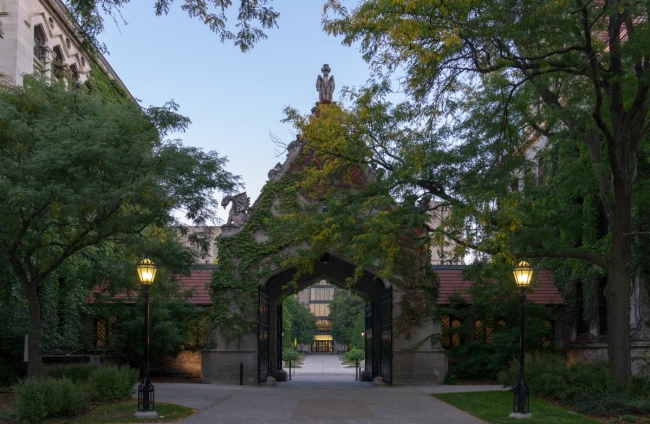You have /5 articles left.
Sign up for a free account or log in.

Cobb Gate at the University of Chicago. The university just approved a new Department of Race, Diaspora, and Indigeneity.
urbsinhorto1837/iStock/Getty Images
In the current climate of backlash against the study and teaching of race-related issues in schools, proposing a new department dedicated to the study of race might seem a foolhardy venture.
The panic over “critical race theory” has prompted 36 states to introduce or pass laws restricting teaching about race and racism in public schools. Expanding academic discussions about race rather than retreating would appear implausible at best, particularly at an institution that has previously avoided such commitments. Yet, as faculty at the University of Chicago, that is exactly what we have done. Last week, we won approval for a new Department of Race, Diaspora, and Indigeneity.
This was no easy task, but our experience suggests a methodical process that invites stakeholders from across the university and country into constructive dialogue can help to defuse hostility and find areas of common interest. In our case, this required literally hundreds of meetings, but the goal was worth it. In the forums and town halls we convened, in one-on-one conversations, and in the institutions of faculty governance charged with approving our proposal, we found that beneath the polarization of the moment, our colleagues and students were eager to discuss new ways of studying these sensitive topics, and their ideas and visions helped shape our proposal.
To be clear, we don’t view debate and dialogue through rose-tinted glasses. There were tough and even painful conversations along the way. And not all colleagues have been persuaded by the intellectual merits of our proposal. But by meeting people where they are, and by engaging in good faith with their concerns and questions, we were able to secure supermajority support among the faculty in the Social Sciences Division and in the Council of the University Senate. Along the way, we convinced some colleagues who were initially skeptical. More importantly, we deepened our intellectual vision and the vision for the department, to everyone’s benefit.
Faculty and students had called for such a department and debated various models over decades. We found new energy to pursue this goal when we, like many of our colleagues across the country, were galvanized in the summer of 2020 after the murder of George Floyd and the uprisings across the country. We joined a group of colleagues in launching the #MoreThanDiversity campaign, which sought to expand conversations about diversity, equity and inclusion at the University of Chicago. Some of the faculty involved in the campaign formed a committee to explore possible models for a department dedicated to the study of race and related topics, following established faculty-led processes for developing a new department.
Undertaking this project in the context of a fractious national environment, we also faced a specific institutional challenge—while many of our peers have long had departments dedicated to the study of race, some for over half a century, the University of Chicago has never had such a department. For the last 25 years, the Center for the Study of Race, Politics and Culture was the only home on campus for research and pedagogy related to race. Our present task was to mobilize the energy and broad academic support needed for a department with the capacity to hire and promote scholars with expertise in this area.
As latecomers to department-building in the field, we decided that rather than replicate existing models, we should create a new framework organized around the categories of race, diaspora and indigeneity. This conceptualization reflects new directions in the field: exciting research that blurs the boundaries between the existing fields of African American studies, Asian American studies, Indigenous studies and Latinx studies has been ongoing for a decade. For example, the concept of diaspora developed in the context of Jewish studies has been mobilized to better understand overlaps and tensions between the African and Asian diasporas; attention to the formation of Afro-Latinx identities has drawn on insights from African American studies; and a growing body of new work attends to the overlaps between Black and Indigenous histories and epistemologies. We came to the conclusion that a department organized around the categories of race, diaspora and indigeneity would best position us to draw on these developments and cultivate innovative synergies.
This is not the framework with which we started. Within our committee, we considered a variety of models and deliberated extensively among ourselves before landing here. As is true of all our individual research projects, we set out not with conclusions, but questions. We then amassed the evidence we needed from surveys, focus groups, a study of the university’s history in these areas and a close examination of parallel departments at peer institutions. Our nine-month open-ended inquiry, supported by the research assistance of graduate students at the forefront of knowledge production, resulted in a proposal for a Department of Race, Diaspora, and Indigeneity (RDI). In this period, our committee challenged each other and our respective stances, eventually coalescing around this vision.
We would soon realize that as hard as it was, deciding on a model and writing the proposal would be the easy part. Our next and biggest challenge was persuading colleagues around the university that RDI was not only an innovative intellectual vision but that the University of Chicago was the right place to undertake this ambitious project. For some skeptics and opponents of the proposal, RDI was nothing more than an ideological and political program masquerading as an intellectual project; others worried that this department would not maintain the rigorous standards of the university. Yet another group of colleagues was broadly supportive of having a department in this area of study but concerned that this approach reified categories such as race or would be internally incoherent. Along the way, we also heard from many colleagues who saw the merit and promise of the RDI model and spoke compellingly about what its presence on campus would mean for their own work.
Buoyed by widespread support and listening attentively to the criticism and feedback of as many of our colleagues as possible, we honed the proposal over the summer of 2021. Even after the successful vote within the Social Sciences Division in November 2021 and up until a week before the final vote in the Council of the University Senate, we continued to solicit feedback and deepen our thinking about the structure of the future department.
We learned from this experience that building an ambitious new program in the study of race in this moment is not simply about winning over critics. It also requires an openness to having your position challenged and changed, and a hope that your interlocutors share the same attitude, even if they never come to endorse your project.
What happened at the University of Chicago was not that we found a “middle ground” between both sides. Rather, we proliferated spaces for robust engagement and discussion that not only fostered a majority coalition but also produced the best version of our intellectual vision. We hope the practices of intellectual openness and collaboration we fostered throughout this 18-month process will help guide the first Department of Race, Diaspora, and Indigeneity—and, possibly, encourage similar efforts elsewhere in this challenging time.




